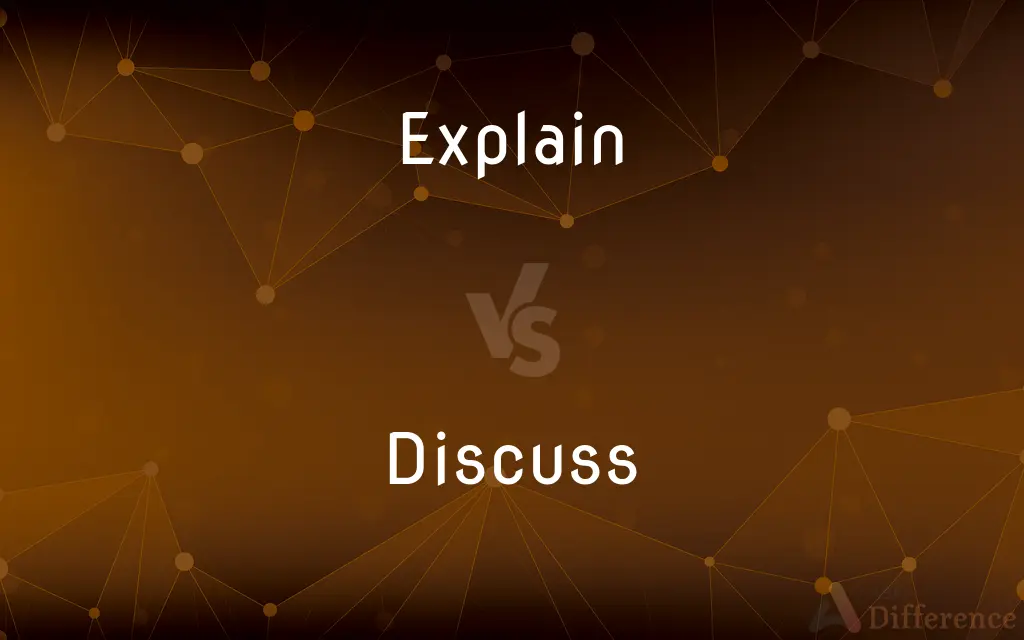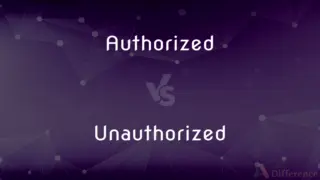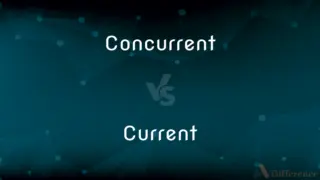Explain vs. Discuss — What's the Difference?
By Tayyaba Rehman & Maham Liaqat — Updated on March 30, 2024
Explaining involves clarifying or making something understandable through detail and fact, while discussing entails a more interactive exploration of a topic, often involving multiple viewpoints.

Difference Between Explain and Discuss
Table of Contents
ADVERTISEMENT
Key Differences
When someone explains a concept, their goal is to make their audience understand it by providing detailed information and necessary background. This process is generally one-directional, from the explainer to the listener or reader. On the other hand, discussing a topic implies a two-way interaction, where multiple participants share ideas, perspectives, and questions about the subject matter, aiming for a deeper exploration rather than just understanding.
Explanation often involves breaking down complex ideas into simpler parts, using definitions, examples, and comparisons to clarify the subject. It is a foundational approach in educational settings where the objective is clear understanding. Whereas, discussion goes beyond mere understanding to engage with the ideas, critique them, and explore their implications. It is a dynamic process that can lead to new insights and understandings among the participants.
In explaining, the focus is on accuracy, clarity, and ensuring that the audience grasps the concept or process being described. The explainer takes on the role of an expert or instructor, guiding the audience through the information. On the other hand, in a discussion, the emphasis shifts to exchange and exploration. The roles of participants are more fluid, with everyone potentially contributing knowledge and viewpoints.
The context in which explaining and discussing occur can also differ. Explanations are often found in instructional materials, manuals, and informative texts, where the primary goal is to inform. Discussions, however, are more common in forums, classrooms, and meetings, where the purpose is to explore topics in depth and from various angles.
The outcome of explaining is typically the acquisition of knowledge or skills. The listener or reader comes away with a clearer understanding of the topic. In contrast, the outcome of a discussion can be more varied, including not only a deeper understanding but also the generation of new ideas, solutions to problems, and sometimes even more questions than answers.
ADVERTISEMENT
Comparison Chart
Goal
To clarify or make something understood
To explore a topic through multiple viewpoints
Interaction
One-directional (from explainer to audience)
Two-way interaction among participants
Focus
On detail, clarity, and factual information
On exploration, critique, and implication
Role
Presenter as an expert or instructor
Participants share ideas and perspectives
Context
Instructional materials, manuals, informative texts
Forums, classrooms, meetings
Outcome
Acquisition of knowledge or skills
Generation of new ideas, solutions, deeper understanding
Compare with Definitions
Explain
To make something clear or easy to understand by describing or giving information about it.
The teacher explained the concept of photosynthesis with a detailed diagram.
Discuss
In discussions, asking questions to provoke thought is common.
The teacher discussed the novel by asking thought-provoking questions.
Explain
Explaining often involves answering "how" and "why" questions about a topic.
The manual explains how to assemble the furniture step by step.
Discuss
Discussing often encourages exploring all sides of a topic.
In the meeting, they discussed the pros and cons of remote work.
Explain
Explanation can simplify a complex process into understandable components.
The scientist explained the DNA replication process in simple terms.
Discuss
To talk about a topic in detail, considering different ideas and opinions.
The panel discussed the impacts of global warming on agriculture.
Explain
Explaining aims at reducing misunderstanding and confusion about a topic.
The FAQ section explains the common doubts customers might have.
Discuss
Discussion can lead to the synthesis of new ideas or solutions.
The team discussed the project challenges and brainstormed possible solutions.
Explain
In explaining, the use of examples and analogies is common to clarify complex ideas.
To explain the theory of relativity, one might use the analogy of a person standing on a moving train.
Discuss
Discussing a topic can deepen understanding and encourage critical thinking.
The students discussed the ethical implications of artificial intelligence in society.
Explain
Make (an idea or situation) clear to someone by describing it in more detail or revealing relevant facts
He explained the situation
‘It's a device of great age,’ the professor explained
They explained that their lives centred on the religious rituals
Discuss
Talk about (something) with a person or people
They were discussing where to go for a drink
I discussed the matter with my wife
Explain
To make plain or comprehensible.
Discuss
To speak with another or others about; talk over
Discussed the matter briefly.
Explain
To define; expound
We explained our plan to the committee.
Discuss
To examine or consider (a subject) in speech or writing
The book discusses the challenges that journalists face today.
Explain
To offer reasons for or a cause of; justify
Explain an error.
Discuss
To speak with another or others about something
As we discussed yesterday, the problem could have more than one solution.
Explain
To offer reasons for the actions, beliefs, or remarks of (oneself).
Discuss
To examine or consider a subject in speech or writing.
Explain
To make something plain or comprehensible
Let me explain.
Discuss
To come to an agreement as a result of a discussion
As we discussed, you will clean your room before going out.
Explain
To make plain, manifest, or intelligible; to clear of obscurity; to illustrate the meaning of.
She is about to explain a chapter of the Bible to the Sunday School students.
She tried to explain but he wouldn’t listen.
Discuss
(transitive) To converse or debate concerning a particular topic.
Let's sit down and discuss this rationally.
I don't wish to discuss this further. Let's talk about something else.
Explain
To give a valid excuse for past behavior.
Discuss
To communicate, tell, or disclose (information, a message, etc.).
Explain
(obsolete) To make flat, smooth out.
Discuss
To break to pieces; to shatter.
Explain
(obsolete) To unfold or make visible.
Discuss
To deal with, in eating or drinking; consume.
Explain
(intransitive) To make something plain or intelligible.
Discuss
To examine or search thoroughly; to exhaust a remedy against, as against a principal debtor before proceeding against the surety.
Explain
To flatten; to spread out; to unfold; to expand.
The horse-chestnut is . . . ready to explain its leaf.
Discuss
To drive away, disperse, shake off; said especially of tumors.
Explain
To make plain, manifest, or intelligible; to clear of obscurity; to expound; to unfold and illustrate the meaning of; as, to explain a chapter of the Bible.
Commentators to explain the difficult passages to you.
Discuss
To break to pieces; to shatter.
Explain
To give an explanation.
Discuss
To break up; to disperse; to scatter; to dissipate; to drive away; - said especially of tumors.
Many arts were used to discuss the beginnings of new affection.
A pomade . . . of virtue to discuss pimples.
Explain
Make palin and comprehensible;
He explained the laws of physics to his students
Discuss
To shake; to put away; to finish.
All regard of shame she had discussed.
Explain
Define;
The committe explained their plan for fund-raising to the Dean
Discuss
To examine in detail or by disputation; to reason upon by presenting favorable and adverse considerations; to debate; to sift; to investigate; to ventilate.
Explain
Serve as a reason or cause or justification of;
Your need to sleep late does not excuse your late arrival at work
Her recent divorce amy explain her reluctance to date again
Discuss
To deal with, in eating or drinking.
We sat quietly down and discussed a cold fowl that we had brought with us.
Discuss
To examine or search thoroughly; to exhaust a remedy against, as against a principal debtor before proceeding against the surety.
Discuss
To consider or examine in speech or writing;
The article covered all the different aspects of this question
The class discussed Dante's `Inferno'
Discuss
Speak with others about (something); talk (something) over in detail; have a discussion;
We discussed our household budget
Common Curiosities
Can explaining be part of a discussion?
Yes, explanations can be part of discussions, especially when clarifying concepts or providing background information to deepen the conversation.
How do explaining and discussing contribute to learning?
Explaining provides the foundational understanding necessary for learning, while discussing fosters critical thinking, deeper insight, and the application of knowledge in broader contexts.
Why is explaining important?
Explaining is crucial for understanding complex ideas, learning new skills, and reducing misunderstandings.
Is one more effective than the other in educational settings?
The effectiveness of explaining versus discussing depends on the educational goal. Explaining is more effective for initially introducing and clarifying concepts, while discussing is better for developing critical thinking skills and deeper understanding.
Can discussions happen without a prior explanation?
Discussions can occur without prior explanations, especially if participants have a base level of knowledge about the topic. However, initial explanations can enhance the depth and quality of discussions by ensuring all participants have a common understanding.
What is the main difference between explaining and discussing?
Explaining focuses on clarifying and making something understandable, while discussing involves a more interactive and exploratory engagement with a topic.
How do cultural differences affect explaining and discussing?
Cultural norms can influence the preference for and effectiveness of explaining and discussing. Some cultures may value direct instruction and clarity, favoring explaining, while others might prioritize group discussion and consensus-building.
Can explaining or discussing be more challenging in a virtual environment?
Yes, both can be more challenging virtually due to the lack of non-verbal cues, potential technical issues, and the difficulty of managing participation, making clear communication and engagement strategies essential.
What makes a good discussion?
A good discussion involves open-mindedness, the exchange of diverse viewpoints, active listening, and the synthesis of new ideas.
Why is it important to have both skills of explaining and discussing?
Having both skills enables effective communication in a variety of contexts, from teaching and learning to collaboration and decision-making. They complement each other by providing clarity and fostering deeper understanding and innovation.
What role does listening play in explaining and discussing?
In explaining, active listening helps ensure the explanation is tailored to the listener's level of understanding. In discussions, listening is crucial for comprehending different viewpoints and for the respectful exchange of ideas.
How do online platforms affect the way we explain and discuss?
Online platforms can expand the reach and accessibility of explanations and discussions, connecting diverse global perspectives. However, they also require clear communication and effective moderation to prevent misunderstandings and ensure productive dialogue.
What is the impact of explaining and discussing on problem-solving?
Explaining can provide the necessary information and framework for addressing a problem, while discussing allows for multiple perspectives and collaborative efforts, often leading to more creative and effective solutions.
How do personal biases affect discussing?
Personal biases can affect discussions by limiting the openness to different viewpoints and potentially leading to conflicts. Awareness and management of these biases are important for healthy and productive discussions.
How does the audience's background affect explaining and discussing?
The audience's prior knowledge, interests, and experiences can significantly influence the approach to explaining or discussing a topic. Tailoring the content to the audience's background enhances understanding and engagement.
Share Your Discovery

Previous Comparison
Authorized vs. Unauthorized
Next Comparison
Concurrent vs. CurrentAuthor Spotlight
Written by
Tayyaba RehmanTayyaba Rehman is a distinguished writer, currently serving as a primary contributor to askdifference.com. As a researcher in semantics and etymology, Tayyaba's passion for the complexity of languages and their distinctions has found a perfect home on the platform. Tayyaba delves into the intricacies of language, distinguishing between commonly confused words and phrases, thereby providing clarity for readers worldwide.
Co-written by
Maham Liaqat












































